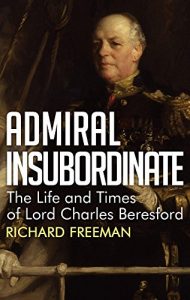The British Navy never had any more wild wild, eccentric and outrageous Admiral than Lord Charles Beresford.
In this brilliant new biography, the best-selling naval historian Richard Freeman tells the story of Britain’s most insubordinate admiral, a man who mixed courage, audacity and pomposity with spite, venom and malevolence.
Three times commander-in-chief, a member of Parliament for twenty years, and a public speaker who filled halls throughout the land – Lord Charles Beresford was all of these. Yet he was also a naval captain who had so little sea experience that he scrambled to qualify for flag rank. He endured long periods of unemployment when in disgrace with the Admiralty, while his one foray into ministerial life ended in resignation. He was also the most reprimanded naval officer of his time – perhaps of all time.
Few men have enjoyed such fascinating and adventure-packed lives. The first ten years of Beresford’s naval career took him to every corner of the globe. He saw it all, from gold-mining to crucifixions, from the wild tribes of Terra del Fuego to the shadowy figure of the Emperor of Japan. When not recklessly throwing himself into perilous riding and wild hunting, he could be found risking his life to rescue fellow sailors.
Yet, after a shaky start, Beresford’s career changed when, at the bombardment of Alexandria in 1882 his tiny HMS Condor took on the guns of one of the massive Egyptian forts. He was an overnight hero and remained so to his death. Three years later his even more spectacular adventures in the Sudan made him the hero of the failed campaign to rescue General Gordon from Khartoum.
But his official life was marred by his persistent hostility to the Admiralty and government. He achieved the dubious honour of one Prime Minister (Lord Salisbury) vowing never to employ him again in a political capacity, and one First Lord of the Admiralty (Reginald McKenna) vowing never to employ him again in the Navy. So antagonistic did he become that his naval career was ignominiously ended by the curtailing of his final command. At the age of 64 all public appointments were closed to him. Never again did the Admiralty or government call on him for any purpose. He still, though, made his mark and, as an MP and then as a peer, he remained centre stage, speaking in Parliament up to a few weeks before his death and still writing letters on the day he died.
Admiral Insubordinate is required reading for historians and military specialists.
Richard Freeman graduated in mathematics before following a career in distance education. He now writes on naval history. His other books include 'The Great Edwardian Naval Feud', 'Britain's Greatest Naval Battle', and 'A Close Run Thing: The Navy and The Falklands War'.
Endeavour Press is the UK's leading independent publisher of digital books.
In this brilliant new biography, the best-selling naval historian Richard Freeman tells the story of Britain’s most insubordinate admiral, a man who mixed courage, audacity and pomposity with spite, venom and malevolence.
Three times commander-in-chief, a member of Parliament for twenty years, and a public speaker who filled halls throughout the land – Lord Charles Beresford was all of these. Yet he was also a naval captain who had so little sea experience that he scrambled to qualify for flag rank. He endured long periods of unemployment when in disgrace with the Admiralty, while his one foray into ministerial life ended in resignation. He was also the most reprimanded naval officer of his time – perhaps of all time.
Few men have enjoyed such fascinating and adventure-packed lives. The first ten years of Beresford’s naval career took him to every corner of the globe. He saw it all, from gold-mining to crucifixions, from the wild tribes of Terra del Fuego to the shadowy figure of the Emperor of Japan. When not recklessly throwing himself into perilous riding and wild hunting, he could be found risking his life to rescue fellow sailors.
Yet, after a shaky start, Beresford’s career changed when, at the bombardment of Alexandria in 1882 his tiny HMS Condor took on the guns of one of the massive Egyptian forts. He was an overnight hero and remained so to his death. Three years later his even more spectacular adventures in the Sudan made him the hero of the failed campaign to rescue General Gordon from Khartoum.
But his official life was marred by his persistent hostility to the Admiralty and government. He achieved the dubious honour of one Prime Minister (Lord Salisbury) vowing never to employ him again in a political capacity, and one First Lord of the Admiralty (Reginald McKenna) vowing never to employ him again in the Navy. So antagonistic did he become that his naval career was ignominiously ended by the curtailing of his final command. At the age of 64 all public appointments were closed to him. Never again did the Admiralty or government call on him for any purpose. He still, though, made his mark and, as an MP and then as a peer, he remained centre stage, speaking in Parliament up to a few weeks before his death and still writing letters on the day he died.
Admiral Insubordinate is required reading for historians and military specialists.
Richard Freeman graduated in mathematics before following a career in distance education. He now writes on naval history. His other books include 'The Great Edwardian Naval Feud', 'Britain's Greatest Naval Battle', and 'A Close Run Thing: The Navy and The Falklands War'.
Endeavour Press is the UK's leading independent publisher of digital books.






